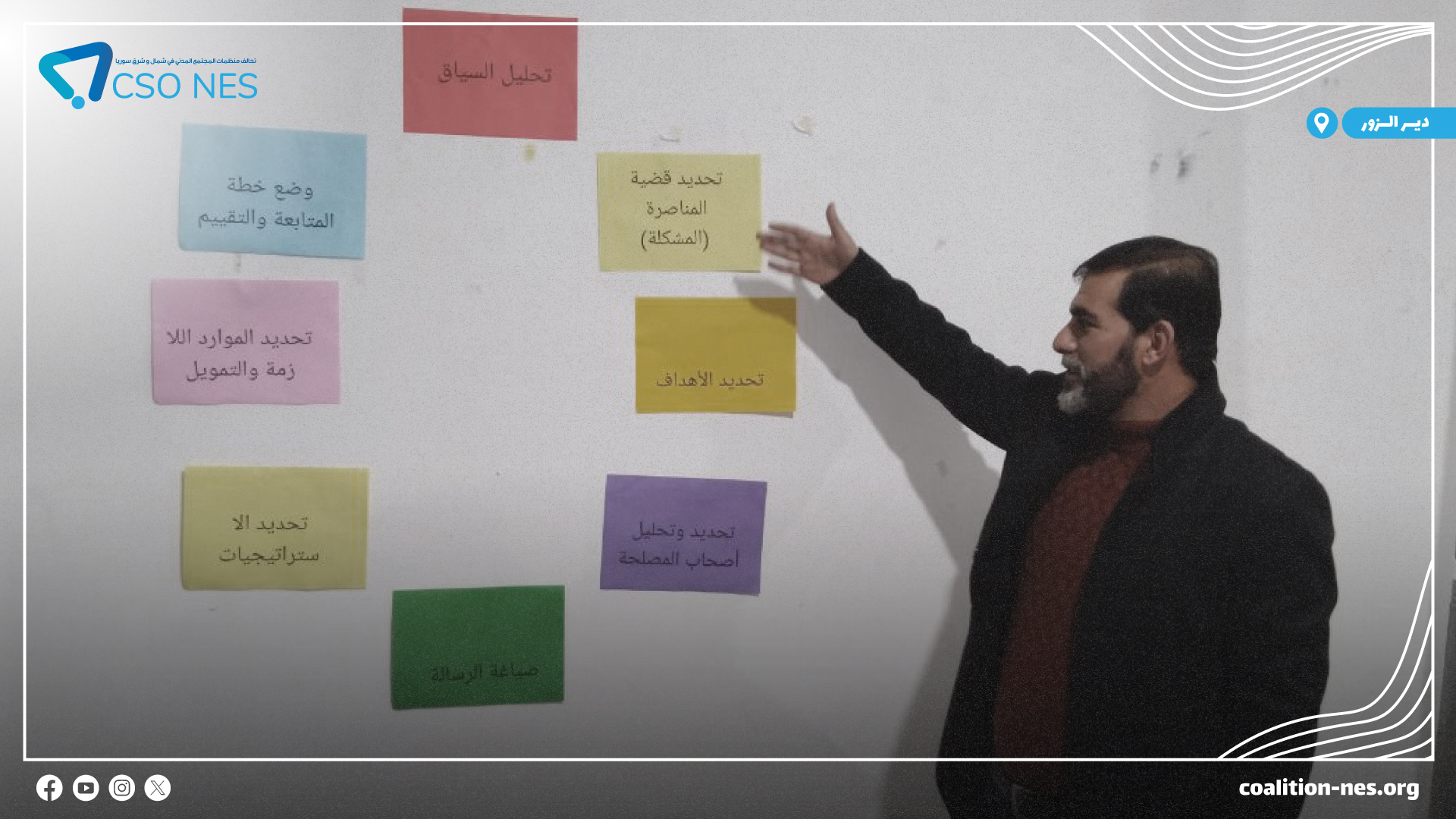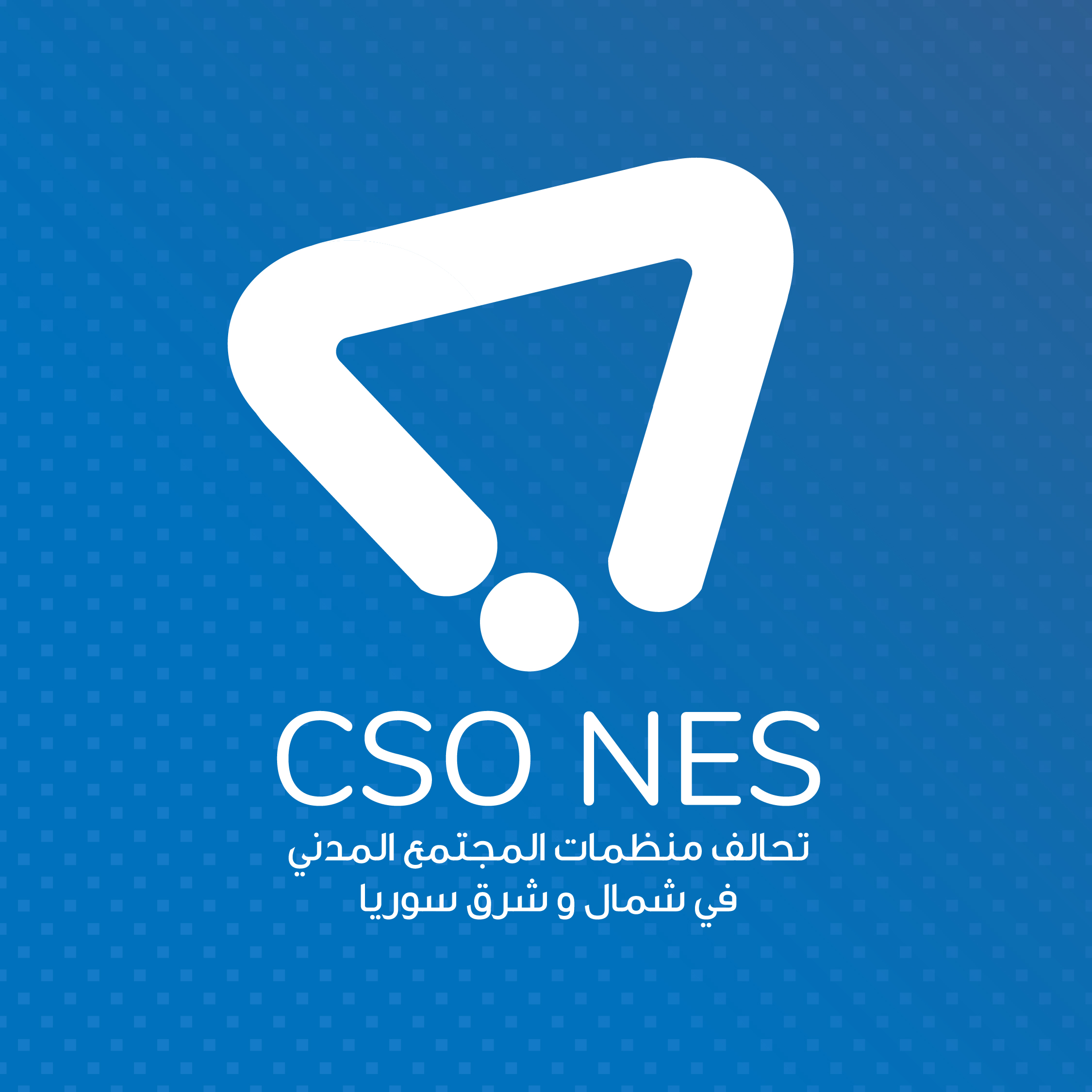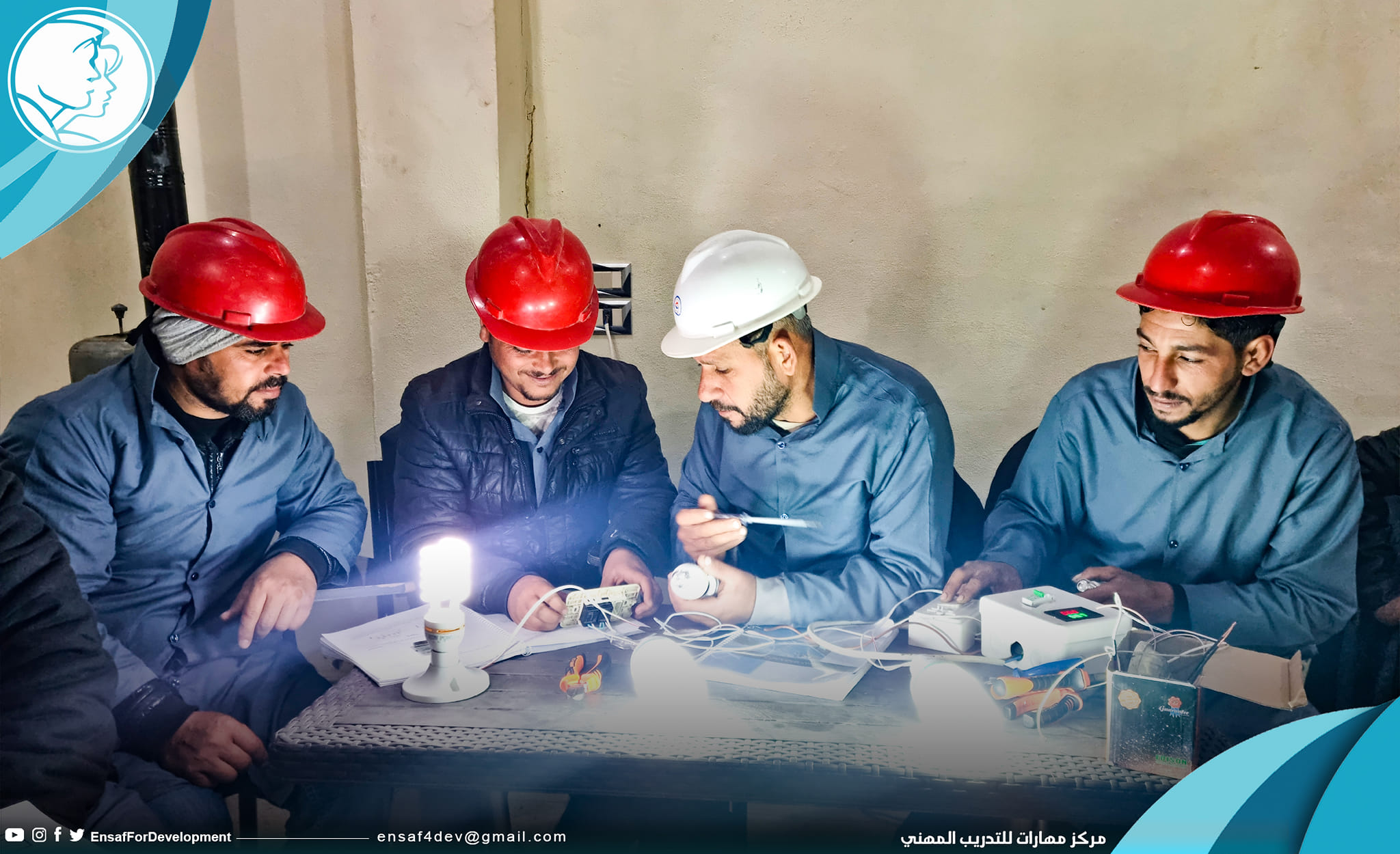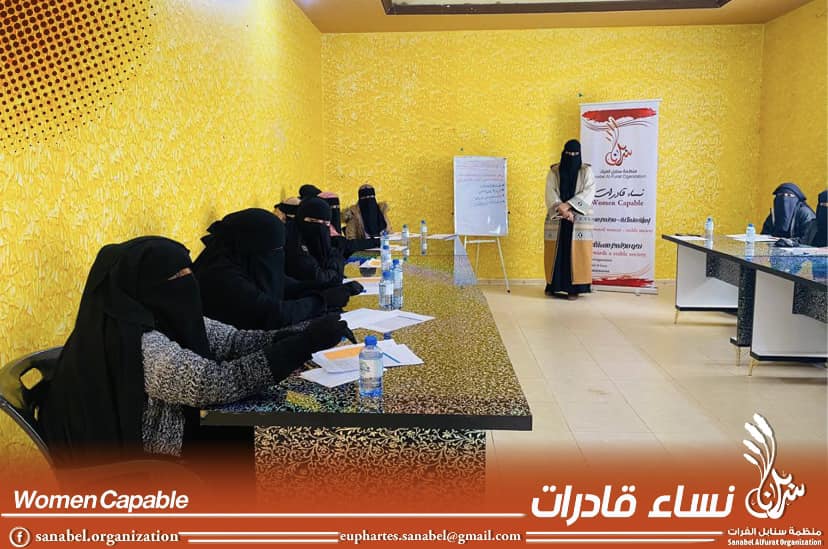CSO – NES News
The Coalition started 2024 with several meetings and visits in Qamishli, Raqqa, Deir ez-Zor, and Manbij. Various events we organized to support electricity, healthcare, agriculture, and education.
In the first week of January, the General Board of the Coalition held multiple meetings with local boards and their affiliated technical committees in the four governorates. The focus was on:
– The committees’ work with experts and the information gathering mechanism aimed at accuracy and needs assessment for the three sectors: education, agriculture, and healthcare.
– Networking activities and the organizations that were connected with.
– Identifying the second advocacy and mobilization issue for each governorate.
– Formulating the general framework for al-Jazeera Region.
In addition to discussing the importance of research studies in the three sectors, the bulletin also highlights the forums through which the experts’ work will be presented. The research papers’ outcomes for each sector will be discussed separately in each forum, making these research studies accessible to everyone for utilization.

Furthermore, the advocacy and mobilization workshop for the Local Board of Deir ez-Zor of the CSO took place in the middle of the month. This was followed by a meeting of the General Board on January 18th at the Coalition office, where a comprehensive review of the first meeting of the month was provided. The activities that were implemented and those being prepared in the three sectors were explained to the experts and stakeholders. The board discussed the information gathering mechanism, research papers, and the challenges faced by the team. Internal and external networking and the activation of al-Jazeera board were also discussed.

The CSO held a meeting on Jan. 20 and 21 with education expert Dr. Ahmed Abu Shakir in the cities of Raqqa and Manbij. The purpose was to discuss his methodology for studying the education sector in NES, which is one of the three sectors targeted by the CSO project. Dr. Abu Shakir presented his methodology for conducting the study, collecting relevant samples, and deriving recommendations and suitable results to support the development of the educational process.


In the same week, specifically in Qamishli, a training workshop for the advocacy and mobilization team of al-Jazeera board took place. The two-day training, held at the “Next” center, aimed to collaborate on developing advocacy campaigns by providing the Coalition board members with tools to plan and execute advocacy campaigns within the framework of the coalition’s work. The training focused on the concept of advocacy, general context analysis, problem identification for the advocacy issue, general and specific objectives, as well as partner and stakeholder analysis, leading to the development of a specific campaign message.

In the context of the advocacy and mobilization campaign for Deir ez-Zor, the Local Board met with the technical team of the Coalition office and the Education Authority in NES on Jan. 22. This meeting was part of the advocacy and mobilization activities for Deir ez-Zor. Several points related to the educational situation in Deir ez-Zor were discussed, and a study outlining the challenges, proposals, and solutions was handed over to the Education Authority. The Education Authority responded to the demands, and they will be further discussed in upcoming education meetings to work on finding solutions to these problems.

Regarding the advocacy and mobilization activities for the Euphrates Region, the Local Board of the Euphrates Region met on Jan. 23, accompanied by the technical team of the Coalition office and the Health Authority in NES. The meeting focused on discussing the lack of sufficient healthcare services in the city of Kobani in the Euphrates Region. The meeting highlighted the absence of essential healthcare services such as a burn center, mammography device, MRI machine, and essential medications for tuberculosis and liver patients. The meeting concluded with submitting a list of demands and necessary proposals to the Health Authority. It was also emphasized to provide a portion of the required medications, supply them to the city, and work on providing other demands and finding suitable solutions for them.

In a related context to the advocacy and mobilization campaigns, the Local Board of Raqqa, accompanied by the technical team of the Coalition office and the Electricity Authority in Raqqa, met on Jan. 24. This meeting was part of the advocacy and mobilization activities for Raqqa. The meeting discussed the deprivation of electricity in a part of Raqqa city and explored solutions and proposals to cover 30% of the city’s electricity needs.

The meetings of the month concluded on Jan. 24 with the participation of the health expert from the Coalition office and stakeholders in Raqqa city. The attendees included organizations working in the medical sector, private medical sector stakeholders such as hospitals and pharmacies, and health authorities affiliated with the Self Administration of North and East Syria (SANES). The meeting discussed the healthcare situation and the challenges facing this sector, with reference to appropriate recommendations for improvement.

Statements of the CSO – NES

158 Syrian Organizations Condemn the Turkish Targeting of Civilian Infrastructure in North and East Syria
The signatories of this statement call on the United Nations Security Council (UNSC) to protect civilians and their livelihoods, as well as to cease the targeting of vital infrastructure necessary for the survival of the population
Coinciding with Christmas and New Year celebrations, as well as the war in Gaza, the areas of north and east Syria, inhabited by diverse ethnic and religious groups, are witnessing destructive Turkish military escalation. This escalation includes targeting vital infrastructure, oil and energy sources, and essential facilities necessary for the survival of the civilian population, including Kurds, Arabs, Assyrians, and hundreds of thousands of Internally Displaced People (IDPs), mostly women and children, who have come from various Syrian regions.
The Turkish airstrikes began on December 24th, 2023, targeting several oil and energy facilities, including an oil station near Al-Kahef (Bana Shikfatiyah) Village Derik (Al-Malikiyah) and the Awda and Al-Saeeda oil fields in the countryside of Qamishli. The bombardment led to the shutdown of the aforementioned stations, depriving the residents of the region of electricity due to the interruption of gas supplies provided by these stations.
On December 25th, 2023, the Turkish army continued its attacks. Drones returned to bomb factories, service facilities, and civilian properties in Kobani (Ain al-Arab), Amuda, Qamishli, and Derik. Among the targeted sites were a medical facility, an olive oil factory, a sewing workshop, livestock feed facilities, a cement plant, a wedding hall, and the only oxygen cylinder manufacturing laboratory in the region. The most brutal attack was carried out against the workers of a printing press, resulting in the death of four employees, including a young woman.
The Turkish Ministry of Defense, in a statement, officially acknowledged responsibility for these strikes, confirming the deliberate intent behind these targeted attacks. The attacks resulted in the killing of eight people, including two young women, and injured over 14 others, as a preliminary toll, spreading panic among the local population.
The repeated Turkish attacks on infrastructure and energy sources destabilize the already fragile stability in the regions of north and east Syria, which has become a haven for hundreds of thousands of IDPs from across the country. This is not the first time that the infrastructure in the region has been destroyed, all in plain sight and view of the international community. The organizations undersigned in this statement demand the cessation of targeting infrastructure, civilian populations, and civilian properties in north and east Syria, where the residents continue to suffer from the ongoing repercussions of the bloody conflict since 2011. These organizations also remind the Turkish government that the International Humanitarian Law (IHL) imposes a strict and continuous obligation to distinguish between civilian properties and military targets. Infrastructure that provides essential services to civilian populations or which is indispensable for their survival enjoys additional protection under IHL, which explicitly prohibits “attacking objects and materials indispensable to the survival of the civilian population, or their destruction, removal, or impairment.”
The signatories strongly condemn the Turkish military escalation in north and east Syria, demanding an immediate cessation of attacks on civilians, infrastructure, vital facilities, and the respect of IHL. They also affirm that the deliberate targeting carried out by the Turkish government amounts to war crimes under the provisions of International Criminal Law (ICL). They request the following:
UNSC/UN/EU: Take immediate measures to protect civilians and their fundamental rights in north and east Syria and exert pressure on the Turkish government to abide by IHL and cease exporting its internal issues to Syrian territories.
International Coalition/USA: Immediately intervene to halt the Turkish attacks on north and east Syria, close the airspace to drones and warplanes targeting infrastructure, civilian properties, and populated areas, and reject the destabilization and undermining of efforts to combat ISIS.
The International, Impartial, Independent Mechanism (IIIM): Intensify the collection of evidence regarding grave human rights violations committed by all parties to the conflict against civilians and civilian properties throughout Syria, including the repeated Turkish violations in north and east Syria. As well as issue a special report on the targeting of infrastructure in 2023 and its impact on civilian populations.
War Crimes Units in countries whose laws allow for trials based on the principle of universal jurisdiction: Expand structural investigations into international crimes in Syria to include those occurring in the northern Syrian regions by all parties to the conflict.
In a related context, the Coalition, under the signature of 109 Syrian organizations, issued an appeal to the international community for an urgent response to alleviate the suffering of the affected population in NES.
The international community, governments, and international organizations must join us in our call for an emergency response to alleviate the suffering of the affected populations, restore essential services, and promote long-term recovery and stability.
The humanitarian crisis in Northeast Syria has reached a critical level, necessitating urgent attention and assistance from the international community. The region has been plagued by conflicts and instability for years, resulting in immense suffering for the local population. Previous displacement of civilians has been witnessed in the area, and now, due to recent Turkish airstrikes and direct targeting of infrastructure, access to essential services has become severely limited in some areas, while completely nonexistent in others, such as gas, water, and electricity. These services are considered vital for civilians, and there are no alternative solutions available.
The destruction of vital infrastructure not only exacerbates the suffering of the local population but also hinders the possibilities of recovery and reconstruction. As a group of local humanitarian organizations, it is our duty and role to convey the true picture of the humanitarian situation in the area. We demand the protection of civilians and civilian objects in accordance with international humanitarian law, as civilians should not be legitimate targets in any conflict. We call on international entities to fulfill their duty in protecting civilians, preserving their dignity, and alleviating their humanitarian suffering through intervention and response to meet their needs and the expected consequences of their lack of access to these services, which can have dire consequences for civilians, including:
1. The lack of essential services such as water, gas, and electricity directly impacts other sectors such as health, education, and community safety. The conflict has caused significant damage to water infrastructure, leaving communities without a reliable source of safe drinking water. This can lead to the spread of diseases, further exacerbating the health crisis in an already strained healthcare sector.
2. Vulnerable individuals, especially children and the elderly, are put at risk, and the psychological impact on people in these areas, who are already grappling with the trauma of war and uncertainty about their future, is immeasurable.
3. The targeting of mills, which renders the ovens out of service, leads to a crisis in accessing bread, and the bombardment hinders children’s access to schools and the ability of families to access vital services within displacement camps.
4. The displacement of civilians and the lack of secure shelter for them, along with feelings of fear and panic.
There has been an escalation of attacks on vital services, facilities, and infrastructure in NES since Jan. 13. Within a span of 72 hours, 80 sites were targeted in the region, resulting in documented injuries to seven civilians, including a woman and two children.
As civil society organizations in NES, we believe that addressing the humanitarian crisis in the area requires a collective effort from the international community. The scale of the crisis surpasses the capabilities of individual organizations or countries. It is essential for governments, non-governmental organizations, and international bodies to come together and pool their resources to provide immediate assistance and long-term solutions. Cooperation and coordination are crucial to ensure that affected populations receive the much-needed support.
We also hope that international human rights committees play a crucial role in responding to the humanitarian crisis in NES. These committees monitor and report human rights violations, advocate for the protection of civilians, and ensure the participation and voices of affected populations, taking necessary steps to effectively address the crisis.
Respecting and adopting international humanitarian law as a legal framework for humanitarian assistance in times of crises is imperative. It outlines the rights and obligations of the parties involved and provides guiding principles for providing assistance to affected populations. Adhering to this legal framework is of utmost importance to ensure the protection and well-being of civilians in NES. Governments and organizations must respect these laws and ensure the delivery of humanitarian aid to those in need, regardless of political or military considerations.
Therefore, we urge the international community, governments, and international bodies to join us in our call for an urgent response to alleviate the suffering of affected populations, restore essential services, and promote long-term recovery and stability.
The SCO – NES Platforms
Snapshots from the meeting of the Local Board of the Euphrates Region, accompanied by the technical team of the Coalition office and the Health Authority for NES, were captured as part of the advocacy and mobilization activities for the Euphrates Region. Several points related to the healthcare situation in the city of Kobani in the Euphrates Region were discussed.
On Jan. 23, the local board for the Euphrates Region met with the technical team from the Coalition office and the Health Authority for North and East Syria as part of the mobilization and advocacy activity for the Euphrates region. pic.twitter.com/wsXHza2Jfa
— CSO – NES (@NesCso) January 26, 2024
An informative infographic about the Coalition to support civil society in NES via a set of goals:
https://www.instagram.com/p/C2sOzTCNW_h/
Snapshots from the Coalition meeting in Manbij with education expert Dr. Abu Shakir were captured to discuss his methodology for studying the education sector in NES. Education is one of the three sectors targeted by the SCO – NES. Dr. Abu Shakir presented his methodology for conducting the study, collecting relevant data, and deriving appropriate recommendations and results to support the development of the educational process.
https://www.facebook.com/permalink.php?story_fbid=pfbid0fvZXaTZ7Dpse8h6CPtK9cCHS4SjBWpEotRYpyvjn5uuhehUAxjDfYs5UKKkoL7url&id=100075781364334
News from Organizations Affiliated with the Coalition:
The civil society organization, PEL – Civil Waves, has released a research report on violations of housing, land, and property rights after 2019 in Ras al-Ain (Serekaniye) and Tel Abyad. The research report highlights the violations committed by the Turkish army and the Syrian National Army factions in the two regions, which have been under their control since the military operation. The testimonies presented in the report revealed key patterns of violations against residents’ properties, including the seizure of their homes and commercial properties, housing others in confiscated homes, unlawful destruction of properties, seizure of agricultural lands, cutting down and uprooting trees, and converting properties and lands into military bases. These violations were not only carried out under the watch of Turkish forces but also with their participation.
To read the full report or download it, please visit the following link:
انتهاكات حقوق السّكن والأراضي والملكية بعد عام 2019 رأس العين/سري كانيه وتل أبيض
Simultaneously with the ongoing training at the Skills Center for Vocational Training in the Ensaf for Development Organization, which includes professions such as household electrical appliance maintenance, solar energy, plumbing, pastry and baking, and sewing, two new trainings have started: “Computer Skills and Office Management.”

As part of the activities of the Women Empowered project implemented by the Sanabel Euphrates Development Organization in Susa and Baghuz, the organization conducted four intensive discussion sessions with the participation of 60 displaced and returning women from the camp. During these sessions, the women discussed the most significant challenges and difficulties that hinder their economic participation and entry into the labor market.


